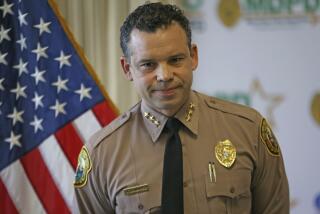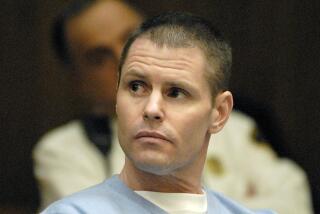Won’t Buckle Under ‘Blackmail,’ Bosnia Leaders Tell Western Mediators : Balkans: Nine of 10 members of collective presidency reaffirm for Lord Owen their opposition to division.
- Share via
ZAGREB, Croatia — The leaders of Bosnia-Herzegovina told Western mediators Saturday that they will not buckle under pressure for an ethnic partitioning of their besieged country and insisted that the international community end a negotiating tactic that amounts to “blackmail.”
Nine of the 10 members of Bosnia’s collective presidency met with European Community mediator Lord Owen and U.N. special envoy Thorvald Stoltenberg to reaffirm the Sarajevo leadership’s opposition to division, which many Bosnians consider a capitulation to nationalist extremism.
Bosnian President Alija Izetbegovic declined to attend the Zagreb meeting, nurturing suspicions of a rift in the leadership, especially after recent statements suggested that he has been worn down by 15 months of bombardment.
Owen, referring to what he said is an ever-worsening humanitarian nightmare, called on Izetbegovic to take part in partition talks set to resume Monday in Geneva with Serbian and Croatian nationalist leaders.
“We can shuttle to and fro, between Sarajevo, Zagreb and Belgrade, but there comes a point where we really have to make some choices in the situation,” a clearly irritated Owen said.
The former British foreign secretary had announced Friday that Izetbegovic would come to Zagreb to discuss a possible ethnic division. But Izetbegovic told reporters in Sarajevo that he was staying behind “because of urgent business.”
Another Muslim member of the presidency, Fikret Abdic, told reporters after the meeting with Owen and Stoltenberg that “all options are still open,” suggesting some of the leaders might be persuaded to accept an ethnic split.
But most of the leaders who traveled here insisted there is no fundamental difference of opinion on the question of division.
“There is no way the members of the presidency will change their decision of yesterday,” said Vice President Ejup Ganic, referring to a meeting in Sarajevo at which seven presidency members, including Izetbegovic, rejected the idea of ethnic partitioning.
“This is racism,” Ganic said. “What would you do if you went to America and it was said all blacks should be in one part of the country, all whites in another and the Jews in another?”
Despite the moral complexities, Owen and Stoltenberg have encouraged Izetbegovic and other Bosnian leaders to negotiate with Serbian and Croatian leaders rather than continue fighting a losing war against better-armed opponents.
Bosnian Foreign Minister Haris Silajdzic said the Sarajevo government is instead calling on the international community to militarily impose peace in Bosnia so that serious talks can be held.
He described the U.N. mediation effort launched last August as “10 months of theater” that allowed Serbian militants to seize land and terrorize civilians while the political leaders held fruitless talks.
“There is this great discrepancy between the forces. As long as one side has tanks and the other doesn’t, these aren’t talks, it’s blackmail,” Silajdzic said of the mediators’ attempts to corral Bosnian leaders into negotiating an ethnic partition.
He conceded that he sees no sign the international community is more willing now than earlier in the war to use force to halt the militants’ land grab. Bosnian leaders are repeating appeals for foreign intervention to stop the shelling of Sarajevo and other cities largely to highlight the fact that none of the diplomatic moves so far has eased that persistent danger to civilians, Silajdzic said.
“It is time to realize that mere confinement, or containment, of the Bosnian problem will not be the solution,” the foreign minister said of the West’s recent change in priorities from ending the war to trying to prevent its spread.
The 2 million Muslim Slavs of Bosnia, as well as several hundred thousand Serbs and Croats still committed to integration and unity, have been confined to six ravaged urban enclaves and subjected to daily bombardments.
Sarajevo and Srebrenica, two of the cities the U.N. Security Council has proclaimed “safe havens” while providing no real protection, are without water, electricity or sufficient food, and diseases such as typhus are already spreading among the trapped civilians.
U.N. High Commissioner for Refugees Sadako Ogata warned from Geneva that Bosnians face “the very real threat of death not only by bombs and bullets, but by thirst, disease and starvation.”
The ethnic partitioning proposed by Bosnian Serb rebel leader Radovan Karadzic and Bosnian Croat chieftain Mate Boban would solidify their forces’ hold over 90% of the country and confine Muslims to ill-supplied U.N. enclaves.
Karadzic has threatened that his gunmen would feel justified in defeating the Muslims militarily if the Sarajevo government fails to accept their demand for division.
His forces have stepped up the pressure on the Bosnian government in recent days by blocking all fuel and food convoys into Sarajevo, and Boban’s Croatian gunmen have similarly cut off vital supplies to Muslims in central Bosnia.
More to Read
Sign up for Essential California
The most important California stories and recommendations in your inbox every morning.
You may occasionally receive promotional content from the Los Angeles Times.














